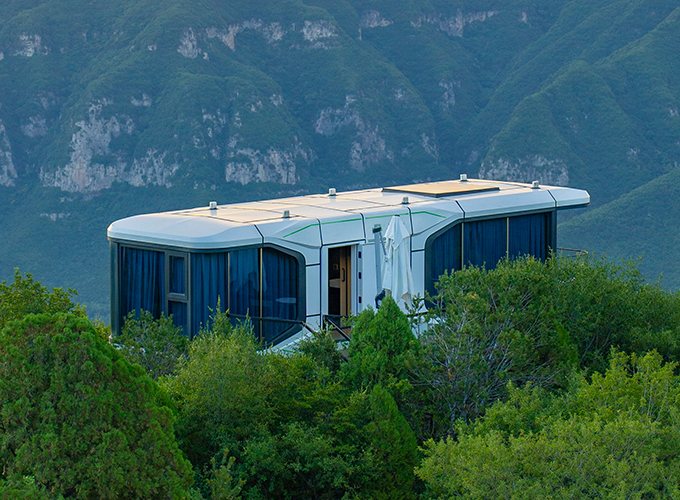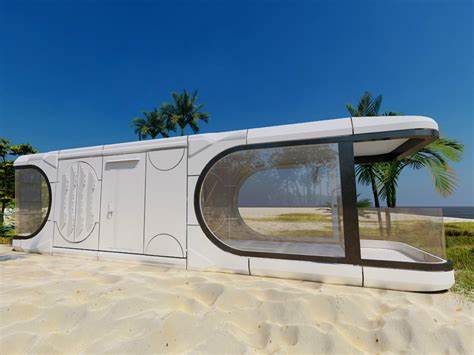In the wave of pursuing unique living experiences, space capsule houses have captivated many with their sci-fi aesthetic and innovative living concepts. For those dreaming of constructing such a distinctive home, understanding which states allow these structures—and the complex regulations behind them—is the first step to turning this vision into reality.

How U.S. States Embrace Space Capsule Houses
Many states in the U.S. have shown tolerance for space capsule houses:
Texas has become a hub for space capsule houses due to its flexible building codes. Here, lenient zoning regulations minimize regulatory hurdles, attracting enthusiasts to realize their dreams. For instance, the openness of rural areas like Boca Chica Village—driven by SpaceX’s local development—reflects Texas’ innovation-friendly stance toward housing.
California, though known for strict land laws, still allows space capsule houses with specific permits and compliance with zoning regulations. Iconic structures like the "Spaceship House" in La Selva Beach—built by landscape architect Mary Gordon between 1969 and 1972—prove that space capsule-style homes can thrive here when meeting standards.
Florida is witnessing a surge in space capsule house popularity. While local zoning laws vary widely by county and city, coastal areas may impose stricter requirements for wind resistance and structural integrity due to climate factors.
New York has seen a rise in urban space capsule houses. Collaborating closely with local authorities to navigate zoning laws is key, as these homes add diversity to the city’s architectural landscape.
Oregon welcomes innovative housing solutions but restricts space capsule houses to single-family residential zones, requiring compliance with the Oregon Residential Specialty Code.
Alaska permits space capsule houses despite its remote location, but homes must adhere to strict insulation and heating codes to withstand harsh winters.
Colorado supports space capsule houses in rural areas, though local regulations must be followed to avoid legal issues.
Washington, Minnesota, Missouri, Louisiana, and Montana also allow these homes, with varying degrees of flexibility—rural regions often have looser rules, while urban centers demand stricter compliance.
Breakdown of State-Specific Building Codes
California
Due to seismic risks, California enforces rigorous codes: all space capsule houses must meet the California Building Standards Code (Title 24). The permitting process is lengthy, with potential extra engineering requirements in some counties. Design professionals must ensure structures can withstand earthquakes and extreme weather.
Texas
Texas offers flexibility, prioritizing alternative housing and simplifying permitting compared to other states. However, cities like Houston and Austin require compliance with the International Residential Code (IRC), while rural areas have more relaxed rules. Engineering certification may be needed to verify structural safety.
Florida
Florida’s codes are shaped by hurricanes and heavy rainfall, emphasizing wind resistance and structural integrity under the Florida Building Code. Permitting is complex, especially along coastlines, often requiring engineer certification.
Oregon
Oregon allows space capsule houses in single-family zones but mandates compliance with the Oregon Residential Specialty Code. Permits and inspections are required, with potential extra environmental standards.
Analysis of Zoning and Land Use Regulations
Land Use
In most states, space capsule houses are restricted to residential zones. For example, urban plans may designate specific blocks for residential use, where these homes must fit.
Zoning Codes
Regulations vary: Oregon allows space capsule houses only in single-family zones, while lenient areas may impose fewer restrictions on type or size. Strict zones might dictate aesthetics, dimensions, or setbacks.
Permits
Permits are essential to ensure safety and compliance with land use and community standards. Non-compliance risks fines or legal action, requiring detailed plans and land use documentation.
Building Restrictions
States like California have detailed codes governing construction, materials, and design to align space capsule houses with community aesthetics and safety.
Community Impact
Zoning laws balance residential, commercial, and industrial areas—e.g., separating industries from homes to reduce noise and pollution, preserving livability.

The Permitting Process for Space Capsule Houses
Consult Local Zoning Offices
Verify if space capsule houses are allowed and understand specific rules (e.g., Oregon’s restrictions). Access information via government documents, consultations, or community meetings.
Design Approval
Submit comprehensive plans (floor plans, elevations, structural designs, material lists) that meet local building and safety codes.
Obtain Necessary Permits
Secure construction, electrical, and plumbing permits by filing applications with design blueprints, contractor credentials, and land deeds.
Site Preparation
Execute foundation work and utility installations (water, electricity, drainage) per approved plans, ensuring stability and functionality.
Inspection Process
Undergo multiple checks during construction—for foundations, structures, electrical, and plumbing—to ensure compliance. Issues must be rectified promptly.
Regional Considerations
Foundation Requirements: Complex geological areas may need robust foundations (e.g., pile foundations) to support unique weight distributions.
Weather Adaptations: States with harsh climates (e.g., hurricane-prone regions) require enhanced insulation and structural resilience.
Building a space capsule house is a journey of challenges and surprises. We’re ready to explore this exciting path with builders, turning innovative living dreams into tangible, code-compliant homes.

